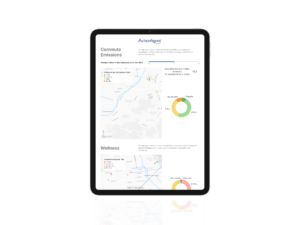Would you like to spend 19 days a year in a car stuck in traffic? It sounds like a post-apocalyptic nightmare, but it’s actually the average amount of time Americans waste taking solo car commutes every year.
Since we’re talking numbers, here’s another recent statistic: 68% of Americans said their entire day could be ruined by their commute. That’s a huge segment of unhappy employees stepping foot into your office on a regular basis. Productivity, at-work satisfaction, and health all take a major hit when employees aren’t given an opportunity to choose a commute outside of a car.

Make it even across the board.
 Once you, or the parking company that manages your garage space, determine the daily rate to park at your office, keep that price consistent for everyone. From the CEO to your newest employee, if you’re charging $15 a day, then everyone will have to pay that amount. You want every employee to feel like they’re being brought on to a team of equals where no one gets special treatment. Not only is this good for morale and avoiding resentment between colleagues, but it’s also helpful in assuring that everyone will be equally unlikely to want to pay for parking and continue making a solo drive.
Once you, or the parking company that manages your garage space, determine the daily rate to park at your office, keep that price consistent for everyone. From the CEO to your newest employee, if you’re charging $15 a day, then everyone will have to pay that amount. You want every employee to feel like they’re being brought on to a team of equals where no one gets special treatment. Not only is this good for morale and avoiding resentment between colleagues, but it’s also helpful in assuring that everyone will be equally unlikely to want to pay for parking and continue making a solo drive.
 The Gates Foundation charges $12 a day for the 700 parking spots they provide at their Seattle boomerang building. This applies to every staff member at the company including Bill Gates. Jonathan Hopkins, Director of Commute Seattle, explains that providing monthly parking passes actually creates “an incentive to continue parking.” When you pay for something in bulk, like monthly parking passes, you’re entitled to get the most value out of what you pay for.
The Gates Foundation charges $12 a day for the 700 parking spots they provide at their Seattle boomerang building. This applies to every staff member at the company including Bill Gates. Jonathan Hopkins, Director of Commute Seattle, explains that providing monthly parking passes actually creates “an incentive to continue parking.” When you pay for something in bulk, like monthly parking passes, you’re entitled to get the most value out of what you pay for.
Charge someone daily and they’ll start to feel it in their wallet — even if what your pay for daily ends up equally to a monthly bill. Just like with car insurance, once that monthly fee is paid you feel like you have to drive your car or else the money spent on the insurance is being wasted. You’re encouraging a behavioral change that needs to be equal across the entire company or employees will find reasons to not participate.
Learn something new.
When Reebok moved its Boston HQ from the suburbs to the Seaport District in the city, they had to adjust from having no access to public transit and offering free parking to only having 140 parking spaces for 700 employees. Due to the lack of transportation choices at their previous office, many of the hundreds of employees didn’t know what the Boston commuter rail was or where it ran. So the company was left having to solve two big issues: how will we help our staff get to work, and how do we educate them about the transportation landscape?
Reebok decided to work on a campaign that would educate and help provide employees with the tools they need to get around on a daily basis. On top of the limited parking, employees have to pay to park in the garage each day — in doing so, the company could actually enforce better commuting habits. Boston is swimming in public transit — you have bikeshare programs, buses, metro, and an employee shuttle service.
Offer your employees real alternatives.
After you figure how to manage parking for your employees, you’ll need to set them up with alternative transportation options that make sense. Coordinate with your city’s bikeshare program, partner with Uber and Lyft for subsidized rides, or set up a vanpool or shuttle system — there are a lot of choices out there and more to come as our transportation landscape continues to change.
Want to learn more about what’s currently out there for you and your employees? We’ve got it all in our FREE ebook!




